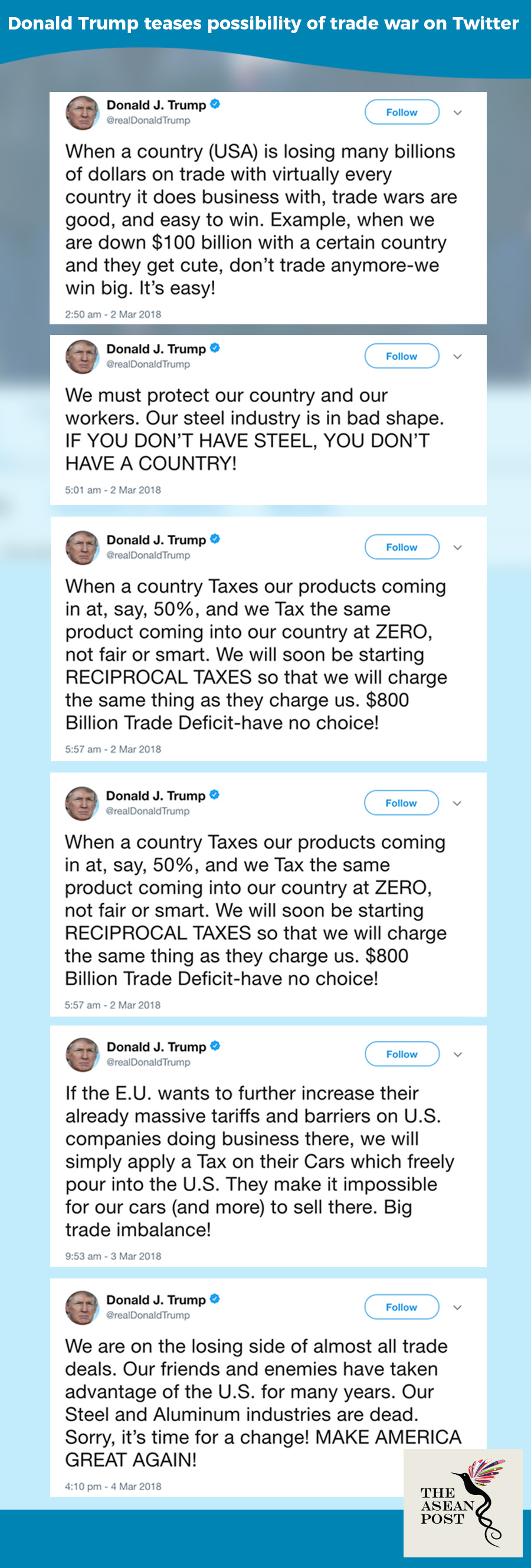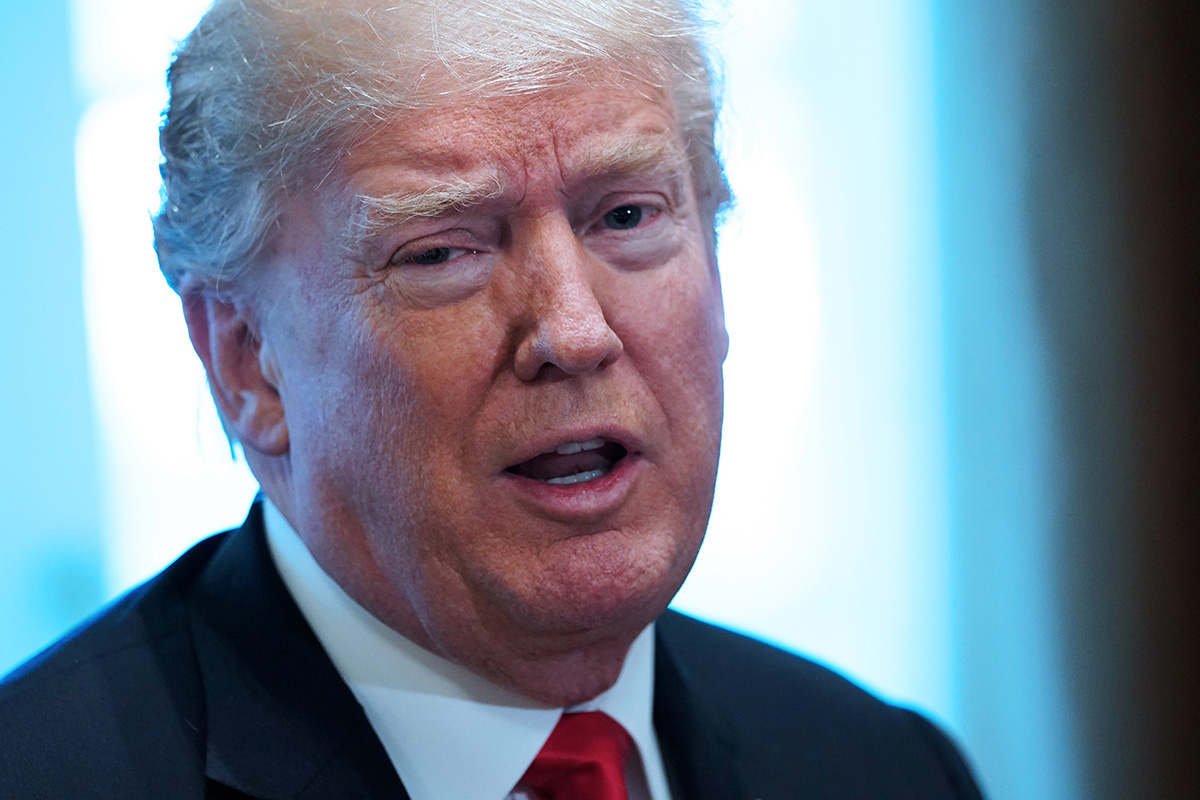With every tweet, Donald Trump seems to be eroding America’s leadership position within the rubrics of the liberal international order. His latest tirade that “trade wars are good, and easy to win” has more than sullied America’s position as the bastion of free trade in the world.
To be fair, his poise towards economic protectionism was not unexpected. During the presidential campaign period, he repeatedly threatened to impose strict tariffs on imports into the United States (US) in a bid to protect American jobs and drive US industry against perceived unfair competition.
Trump’s planned tariffs of 10 percent and 25 percent, respectively, on aluminium and steel imports seems to have rattled the American and world economies. US markets were well and truly spooked as the Dow Jones plummeted 420 points and the Nasdaq and the S&P 500 declined 1.3 percent, respectively. However, Trump remains undeterred.
“We must protect our country and our workers. Our steel industry is in bad shape. IF YOU DON’T HAVE STEEL, YOU DON’T HAVE A COUNTRY!” he tweeted, a day after the market responded to his move.
The dynamics of trade wars
Viewed discretely, Trump’s tweet does hold some water. The steel industry is immensely important to the economic growth of a nation. After all, ironworks were the main driver of the Industrial Revolution in the 19th century which propelled the US to its stature as a global economic powerhouse.
However, the reality today is slightly different from the one a hundred years ago. Today, more than ever, nations and their economies are tightly integrated in an intricate web of relations. No longer, can economies develop in silos and countries often depend on one another even as they pursue their own economic agendas.

At a fundamental level, international relations are undergirded by common interests and when these interests are out of sync, the repercussions can be far reaching. Firstly, it negatively impacts other industries as countries affected by tariffs engage in tit-for-tat retaliatory measures.
In response to Trump’s tentative tariffs on steel and aluminium, China threatened to slap retaliatory tariffs on US exports of soybean, placing the latter’s farming industries in Beijing’s crosshairs. Earlier, China launched a probe into US sorghum imports as a tit-for-tat action against the US slapping higher taxes on imports of Chinese solar panels and washers. China is the US’ top buyer of sorghum and soybean. Chinese customs data revealed that in 2017, the country imported approximately 4.76 million tonnes of sorghum valued at US$1.1 billion. Besides that, US exports of soybean to China in 2016 totalled US$14.2 billion according to the US Department of Agriculture.
Moreover, Trump’s actions could severely impact US allied relations built over decades. These relations gave birth to the Bretton Woods system in use today which relies on a neoliberal approach to economics that was only occasionally punctuated by protectionist undertones. Now, that the latter is fast becoming the mainstream ideology – keenly pursued by Trump himself – US allies are not taking too kindly to such actions.
President of the European Commission, Jean-Claude Juncker blasted the move and promised to “…react firmly and commensurately to defend our interests.” Canada, the largest steel exporter to the US responded strongly as well, stating that the country “…will take responsive measures to defend its trade interests and workers.” Bloomberg cited insider sources which revealed that Mexico was ready to tax US goods in retaliation to Trump’s tariffs. The latter two countries are counterparts of the US in the North American Free Trade Agreement (NAFTA) which would definitely sour his attempts at renegotiating the trade deal.
Implications on Southeast Asia
Southeast Asia will likely suffer from the indirect impact of tariffs on aluminium and steel given that they are not major exports of any Association of Southeast Asian Nations (ASEAN) member state.
According to Manu Bhaskaran, Chief Executive Officer (CEO) of Singapore based independent research and advisory firm, Centennial Asia Advisors, Trump’s recent moves heighten the risk of a trade war as countries engage in retaliatory measures which then lead to a downward spiral of confrontation.
“If the net effect is that global trade contracts, that is bad for Southeast Asia since it is a region with high export exposure,” he added.
Trump’s actions have already elicited responses from Southeast Asian nations – especially those impacted by the earlier tariffs on solar panels and washers.
“Some, like Singapore, Malaysia, Vietnam and Brunei, have gone ahead with the Comprehensive and Progressive Agreement for Trans-Pacific Partnership (CPTPP) trade agreement while they and several other Asian nations are negotiating the Regional Comprehensive Economic Partnership (RCEP) trade agreement. All this is being done to keep up the momentum of trade and globalisation,” he explained.
Besides that, Bhaskaran pointed to Trump’s other policies which weaken the World Trade Organisation (WTO) that could have a knock-on effect on smaller economies.
“The Trump administration’s policies towards the WTO threaten to weaken its functioning, that is also a major risk as the WTO ensures a fair-trading system where disputes are settled amicably through a dispute settlement mechanism. If the WTO weakens, small exporting nations will be bullied by the larger ones and everyone will suffer,” he said.
A key takeaway from Trump’s actions is that no good can come from reverting to a mercantilist era of high economic barriers to trade. The political and economic consequences will be just too costly to bear in the long run. If anything, Trump should understand this – coming from a business and entrepreneurship background himself. However, his lack thereof is fast casting himself and the US as the pariah of the liberal world order.
